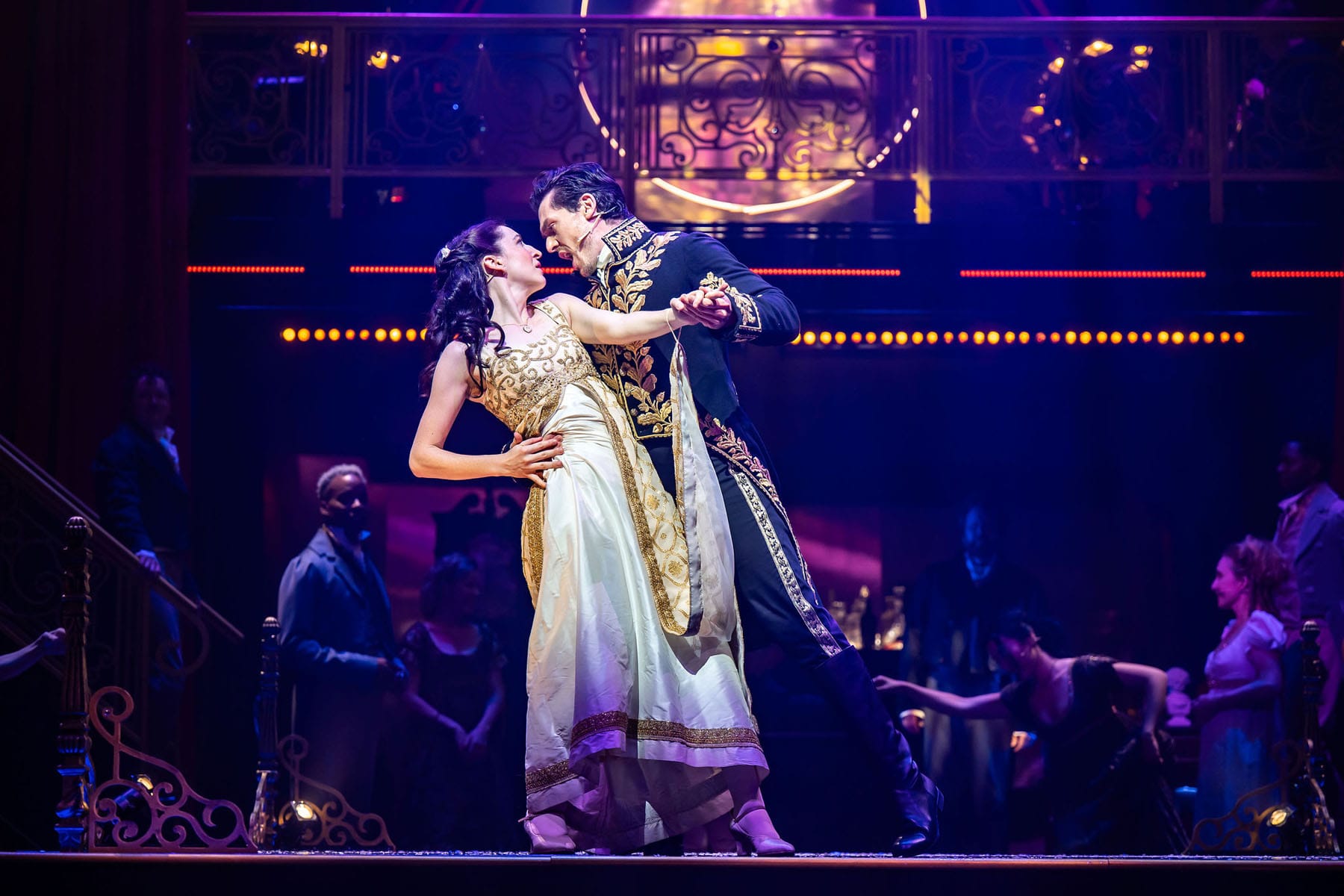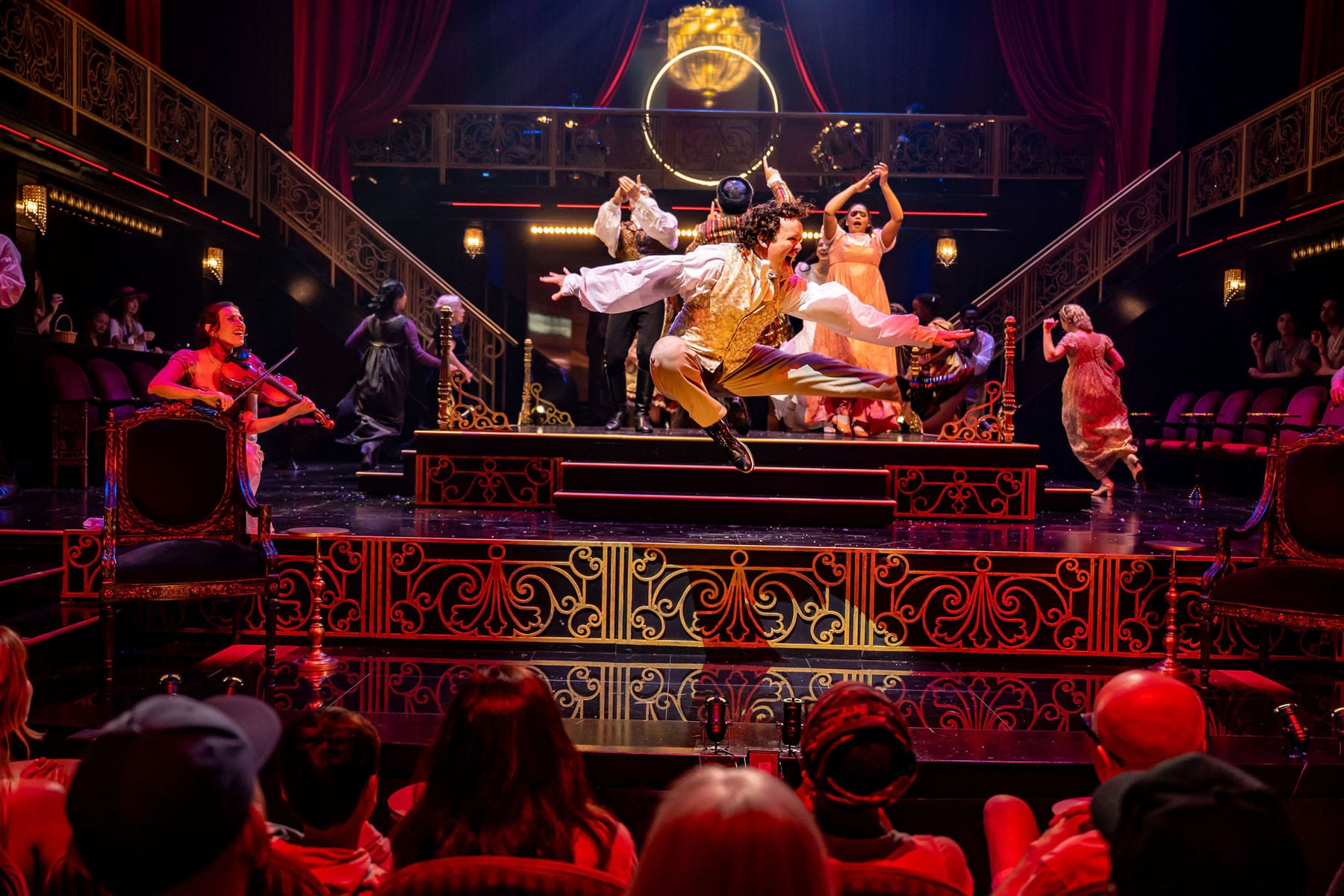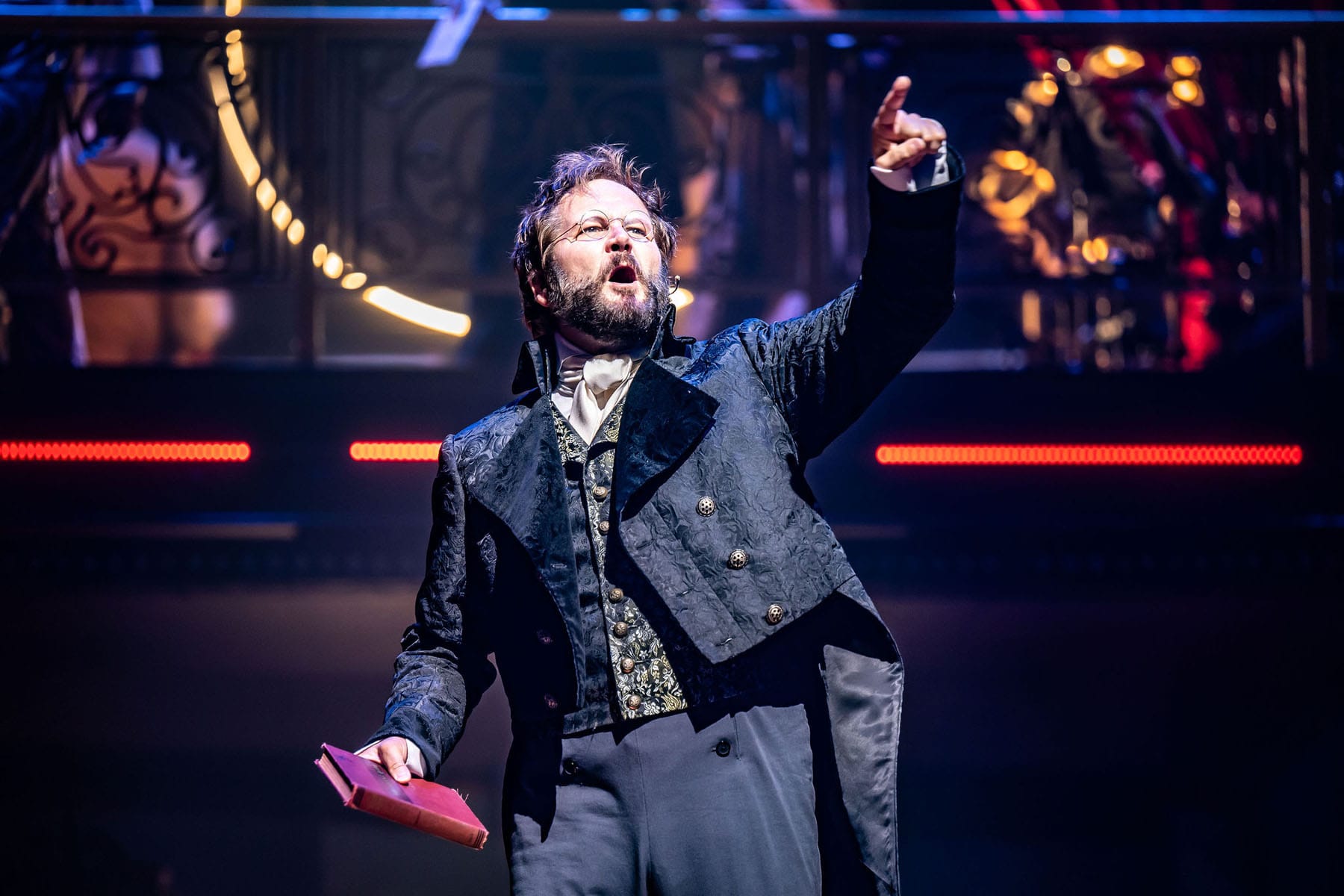Great Comet soars at the Royal Alex
Chris Abraham’s hugely successful production of the Dave Malloy musical transfers to the most elegant theatre in the city, with gorgeous results

If you thought Chris Abraham’s production of Dave Malloy’s Natasha, Pierre & the Great Comet of 1812 (Rating: ✭✭✭✭✭) worked beautifully in the winter and spring of 2024, when it crushed all attendance records at Crow’s Theatre, wait until you see it at the Royal Alexandra Theatre.
Sure, the musical — a co-production between Crow’s and Musical Stage Company, presented by Mirvish — loses some of the intimacy found at the original 200-seat Guloien Theatre venue. But it more than makes up for that with the splendour of the historic beaux-arts building. The musical’s 19th century setting, albeit with a 21st century electro-pop score and sound system, fits right into the plush elegance of the Alex.
Hailey Gillis and Evan Buliung play the title characters, two vastly different members of the Russian aristocracy who are quickly caught up in a story of love, infatuation, bad choices and sacrifice, all inspired by a 70-page section from Tolstoy’s epic novel War and Peace.
The program (hard copy or digital version) provides a handy family tree outlining the connections between the various characters. Malloy also begins the show with a big, lively ensemble number about how everyone in the show has nine names and so you should probably consult that program so as not to be confused. Clever.
The young countess Natasha (Gillis), who’s engaged to Andrey (Marcus Nance), who’s away at one of the Napoleonic wars, travels to Moscow to stay with her strict and proper godmother, Marya (Louise Pitre) and cousin Sonya (Vanessa Sears). While at the opera, she meets Anatole (George Krissa), the dashing but dangerous sibling of the equally immoral Hélène (Divine Brown), who’s unhappily married to the bookish intellectual, Pierre.
Unbeknownst to her husband, Hélène encourages her brother (with whom she has a Game of Thrones style relationship) to seduce Natasha, which jeopardizes the latter’s engagement and her family’s reputation.

Malloy’s approach to the material is gleefully irreverent and yet still respectful of its source. The show is almost entirely sung through, and characters often refer to themselves in the third person, suggesting the omniscient narrator of Tolstoy’s book.
But Great Comet is not as stuffy as all that sounds. A contemporary sensibility underscores everything. It’s there in the cheeky meta-theatrical prologue, as well as an extended party sequence in the second act, which joyously takes place at a particularly tense moment in the narrative to show people dancing, twirling, drinking and even — like rising star Tyler Pearse — leaping into the air to do the splits (sort of caught in the photo above, effectively choreographed by Ray Hogg).
(Note: if you’re sitting onstage or in the first couple of rows, you might be asked to join the festivities; and if you’re in one of the boxes, you might become the temporary object of Anatole’s flirtations.)
What’s thrilling is how, even with so much happening, Abraham and his design team manage to focus your eye on what’s going on in the story. (Someone really needs to hire him to direct an opera or two; he’d be a natural.)
I’ve seen the show now three times, including the Tony Award-winning 2017 production in the completely reconfigured Imperial Theatre on Broadway. And I think this is my favourite version. It is definitely not a park-and-bark musical, and there are only a handful of intact solo numbers. (In one of my theatre-related group chats, I’m the sole defender of the show as a successful piece of musical theatre.) I like to think of this as music theatre rather than a musical. Malloy integrates the music into the action, providing snippets of songs that propel the story along.
My one problem with the work is that too many secondary characters who are rendered so vividly in the first act — like Mary (Heeyun Park, in stunning voice on opening night), Andrey’s sister, and Marya (Louise Pitre), Natasha’s proper godmother — lack resolutions in the second act.
But then again, you can probably chalk that up to the structure of the piece. Great Comet recounts a tiny section of Tolstoy’s novel, with a focus on how Pierre and Natasha’s stories briefly intersect, forever changing both of their lives. In the most affecting parts of the show, Malloy plunges us deeply into these two characters’ psyches as they wrestle with feelings of guilt, unworthiness and ultimately their philosophies of life.
Gillis, as before, is radiant and impulsive as the young and naive Natasha, encountering thoughts and feelings she’s never felt before — all captured in her silvery voice and graceful, dancer-like presence.

Although absent from the stage for long stretches, Buliung’s Pierre gives the show its soul. In his character’s epiphanies near the end of both acts we get closest to the spirit of Tolstoy himself as he questions the meaning and purpose of his life — of any life. There’s a depth and richness in his voice that I don’t recall from his earlier performance, and the economy of his acting in the second act — when he separately confronts Anatole, Andrey and then (for the first time) Natasha — is simply staggering.
The rest of the cast is just as fine. As before, Brown and Krissa are snakily seductive as the main antagonists. Brown’s act one number sizzles with sensuality, while Krissa turns up the heat both vocally and physically.
New in this transfer, Sears plays Natasha’s cousin Sonya with full-throated passion, sometimes overselling/overpowering her role in the story. Lawrence Libor’s energetic turn as Anatole’s bro-like friend, Dolokhov, feels more heightened this time around. Musician Andrew Penner nails the part of gritty-voiced sleigh-rider Balaga, whose appearance, as Malloy points out, really has nothing to do with the story but is great fun. Marcus Nance, besides delivering booming bass solos in both acts — one as the proud Andrey, the other as Andrey’s crotchety old father, Bolonsky — also adds to the band as a roving clarinettist.
Speaking of the band, the increased number of musicians under conductor Ryan deSouza sounds magnificent, as does the beefed up ensemble, which includes such talented artists as Tess Benger, Andrew Broderick, Janelle Cooper, Rita Dottor and Donna Garner.
A few weeks ago, I got to interview Abraham and co-set designers Julie Fox and Joshua Quinlan, who discussed the process of transferring the Crow’s production to the Royal Alex. As part of that talk, I got to mount the stage and walk up the staircases connected to the balcony. It was thrilling.
Discussing these changes and seeing the results, however, are two different things. And the set enhancements are even more effective than what I imagined. Abraham doesn’t overuse the staircases, leaving them to heighten certain moments — such as the meeting between Anatole and Natasha. Occasionally, such as the opera scene and the extended party, it feels like there’s no separation between audience and ensemble. (As Fox pointed out in a quote that I didn’t use, even going out into the theatre lobby and concession areas still feels like you’re in that 19th century world.)
One of my favourite parts of the set remains a raised platform on a revolve, which is manually pushed by actors to depict a character’s movement. What I didn’t fully appreciate the first time I watched it was how the manual pushing suggests all the working class people moving things around in these people’s lives. Brilliant.
Ming Wong’s costumes look stunning in this larger context, especially when enhanced by Kimberly Purtell’s lighting design.
One final thought about the transfer: watching dozens of gifted local actors walk in the same steps as legendary performers from the past (John Gielgud! Ralph Richardson! Helen Hayes! Al friggin’ Jolson!) gave me a huge sense of pride. These artists deserve this. They belong here.
Natasha, Pierre & the Great Comet of 1812 continues at the Royal Alexandra Theatre, 260 King West, until August 24. See details here
In brief
• The news of actor Michael Blake’s death broke on Monday. What a loss to the Canadian theatre scene. Blake, only 53, was an essential part of the Stratford Festival company for a decade, where he memorably played the title role of Othello, as well as Macduff, Caliban and Cominius (in Coriolanus). He also played the Player King in last season’s fine Rosencrantz and Guildenstern are Dead. He was to have appeared in Kanika Ambrose’s new play, Moonlight Schooner, this fall. Here is Joshua Chong’s appreciation in the Toronto Star, which features memories from Blake’s Stratford friends Graham Abbey and Jordin Hall.
• Congratulations to Paolo Santaluccia, who’s just been appointed the new artistic director of Soulpepper Theatre. He succeeds Weyni Mengesha. Santaluccia has a long history with the company. He’s a graduate of their Soulpepper Academy, and has appeared in a number of their shows, including The Seagull and Bed & Breakfast. In addition, Santaluccia is a co-founder of the terrific indie company The Howland Company, and most recently was the associate artistic director of Crow’s Theatre, where he has directed shows like The Wrong Bashir, The Bidding War and his own Dora Award-winning play Prodigal. He will begin at Soulpepper on September 1, and will be responsible for programming the company’s 2026-27 season. See more here.
• I made a last-minute decision to take the GO Bus to Hamilton and catch some shows on the final weekend of the Hamilton Fringe Festival. Look for my coverage of several Fringe shows (featuring artists familiar to Toronto theatregoers) here early next week, as well as reviews of Back to the Future: The Musical (here’s my interview with the show’s Tony and Olivier Award-winning set/costume designer Tim Hatley) and Charlotte Runcie’s Edinburgh Fringe-set novel Bring the House Down. Also, Mirvish just brought back Pride & Prejudice (Sort Of) at the CAA Theatre. Here’s my original rave review.
